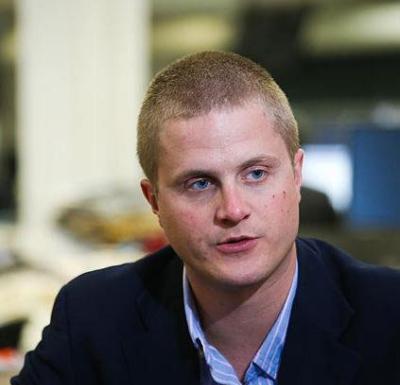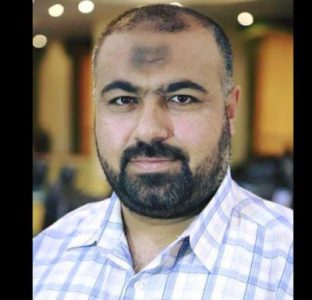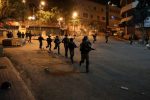In recent years a crackdown by Israeli authorities on human rights NGOs – particularly those focused on Palestinian rights – has caused considerable concern internationally attracting attention in both the media and at the governmental level.
Yet perhaps the most egregious case of Israel’s targeting of the humanitarian sector has been taking place over the last three years with almost zero coverage.
In June 2016 Israeli authorities arrested Mohammed Halabi at the Gaza Strip’s Erez crossing. Halabi a father of five was working as the Gaza director for the international humanitarian NGO World Vision and was returning from a meeting in Jerusalem at the time of his arrest.
Alarm bells ringing
Seven weeks later Israel’s internal security agency the Shin Bet announced with much fanfare spectacular charges against Halabi – namely that he had used his role to redirect tens of millions in World Vision funds to Hamas as part of a decade-long conspiracy to infiltrate the charity.
Incredibly however three years on there has been no conviction. The trial has seen some 120 court sessions in what has been described by the Palestinian Commission of Detainees and Ex-Detainees Affairs as “one of the longest trials” ever. Halabi maintains his innocence.
Alarm bells should have been ringing from the start – in particular due to the appalling conditions Halabi has been subjected to and the ongoing denial of his right to due process. After his detention the World Vision staffer was held for three weeks without access to a lawyer (the maximum such period in non-“security” cases is 48 hours).
Halabi his family and lawyers have provided multiple and credible accounts of torture at the hands of Shin Bet interrogators – indeed even “several witnesses the prosecution has presented to court have also accused Israeli intelligence officers of torturing them during interrogation”.
Local and global human rights groups such as Amnesty International have long recorded the routine use of torture by Israeli authorities. Meanwhile as documented by the United Nations High Commissioner for Human Rights Halabi’s lawyer was only given access “to all previously undisclosed evidence one year and a half after the start of the trial” and “permitted to start examining defense witnesses 24 months into the trial”.
In addition Halabi reportedly “never receives accurate translations of the court proceedings” and Israel has also refused to allow his lawyer “to visit Gaza and meet witnesses who could bolster his case” or to grant permits for witnesses to come and testify in court.
Judicial farce
Extraordinarily in March 2017 the judge himself urged Halabi to accept a plea deal on the grounds that Palestinian suspects in “security” cases are almost always convicted: “You’ve read the numbers and the statistics” the judge told him. “You know how these issues are handled.”
But it’s not just the judicial farce that undermines the case against Halabi; it is also the matter of the evidence or lack thereof. After World Vision pointed out that the amount of money allegedly diverted to Hamas exceeded the NGO’s total budget an Israeli government spokesperson said the exact figures were irrelevant.
In August 2016 “Western diplomats” told Haaretz that they had not received any intelligence or evidence about Halabi. The following year an Australian government investigation “found no evidence taxpayer money was misused by the World Vision NGO in the Gaza Strip”.
World Vision which initiated two separate inquiries – carried out by Deloitte for World Vision International and Ernst and Young for World Vision Australia – reiterated as recently as May that it had still not seen “any evidence” to support the Israeli authorities’ allegations.
Comments by multiple sources – including World Vision Israeli media and Halabi’s family – suggest a key role might have been played by an ex-World Vision employee who “bore a grudge” after being fired by Halabi. Having left Gaza the individual is allegedly “now acting as a witness in the Israeli case”.
Confession under torture
In the immediate aftermath of the indictments being announced a senior Israeli official declared that “the evidence is the confession of the detainee”. This “confession” was obtained from Halabi when he had no legal representation and was subject to torture – and one that he subsequently retracted.
So what is going on here?
The 2016 indictments were headline news internationally and Israeli officials went to great efforts to publicize the allegations among journalists and diplomats.
Public Security Minister Gilad Erdan claimed the indictments proved substantial links between aid groups and “terrorist” organisations adding for good measure: “I imagine that in the World Vision organisation which is very anti-Israeli they turned a blind eye.”
Israel’s Foreign Ministry focused on “spread[ing] the news …among liberal and religious groups who support World Vision” and the ministry’s then-director Dore Gold wrote to foreign ministries around the world baldly asserting that Halabi “is actually a major figure in the Hamas terrorist organisation”.
Even as the court case drags on Israel and its supporters have repeated the accusations against Halabi as fact as part of a broader agenda. A recent publication by Israel’s Strategic Affairs Ministry for example cites the unproven allegations as proof of “international relief organisations” having ties with Hamas. NGO Monitor a serial harasser of civil society groups states on its website that Halabi was “revealed … to be a Hamas terrorist”.
Disturbing silence
Increasing attention is being paid to the deteriorating atmosphere for human rights groups at the hands of Israeli authorities; even a UK minister recently acknowledged reports of “pressure exerted against NGOs particularly those critical of Israel’s conduct in the occupied Palestinian territories”.
But while examples such as the ongoing efforts to deport Human Rights Watch official Omar Shakir – and to a lesser extent legislative and financial steps targeting NGOs – have elicited international criticism there is a disturbing silence over the Halabi case.
For NGOs in Gaza Halabi’s case prompts the question – could we be next?
The nightmare experienced by Halabi and his family exposes the routine violence and corruption of Israel’s Shin Bet and judicial system and the relationship between the two. It has also highlighted the deference offered to that system by Israel’s Western allies and the inability to see – or call out – a politicized stitch-up dressed up as “counter-terrorism”.
In 2016 Israeli rights groups slammed authorities for using Halabi’s indictment to attack “humanitarian operations in the Gaza Strip as a whole”. For NGOs in Gaza Halabi’s case prompts the question – could we be next? As Israel seeks to shrink the humanitarian space intimidation works.
Whatever the result of an utterly discredited legal process Halabi’s case is now a litmus test for Western governments and their willingness to push back against Israel’s assault on civil society.
– Ben White is the author of ‘Israeli Apartheid: A Beginner’s Guide’ and ‘Palestinians in Israel: Segregation Discrimination and Democracy’. He is a writer for Middle East Monitor and his articles have been published by Al Jazeera al-Araby Huffington Post The Electronic Intifada The Guardian and more. This article was published in the Middle East Eye.













